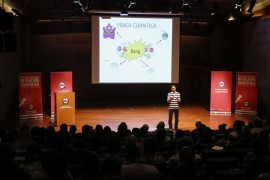- Fecha(s): 06/10/2022
- Lugar: Salón de Grados de la Facultad de Economía y Empresa de la Universidad de Murcia
- Ponente: Paul De Grauwe

El eminente economista Paul De Grauwe, en la víspera del día de la ceremonia en la que tendrá lugar su investidura como Doctor Honoris Causa de la Universidad de Murcia, impartirá un seminario/conferencia dirigido a los estudiantes del programa de doctorado DEcIDE y, en general, a todos los estudiantes y profesores de la Facultad de…
- Fecha(s): 30/05/2022
- Lugar: Instituto Centro de Investigación Operativa (Universidad Miguel Hernández). Se grabará.
- Ponente: Agustí Segarra Blasco

La investigación científica y la divulgación, esto es poner al alcance de un público más amplio son dos caras de una misma moneda, pero no es lo mismo. Entre los científicos y también entre los economistas encontramos a grandes investigadores que con el paso de los años también se han convertido en divulgadores muy populares…
- Fecha(s): 18/05/2022
- Lugar: Seminario de Métodos Cuantitativos. Universidad de Murcia
- Ponente: José Rodolfo Morales (Universidad de Valladolid)

This paper formulates and analyzes a dynamic game between two trading regions that face a transboundary pollution problem. We study how the distribution of firms and trade costs affect the optimal emission decision of governments and how the resulting environmental policy would alter the allocation of the industry between both countries. The underlying microeconomic behaviour…
- Fecha(s): 09/03/2022
- Lugar: Sala Seminarios CIO (Se grabará).
- Ponente: Juan Carlos Gonçalves (UMH-Ayuda Margarita Salas).

Project management is an important body of knowledge and practices that comprises the planning, organization and control of resources to achieve one or more pre-determined objectives. In this presentation, we introduce ProjectManagement, a new R package that provides the necessary tools to manage projects in a broad sense, and illustrate its use by examples. We…
- Fecha(s): 14/06/2021
- Lugar: Seminarios online CIO: http://cio.edu.umh.es/seminariosonline/
- Ponente: Ricardo Martínez, Universidad de Granada

We consider the problem of randomly allocating indivisible units of a resource among agents with conflicting claims on the resource. In the two-agent case, we characterize three focal rules combining axioms reflecting principles of compensation and sacrifice: probabilistic uniform awards, probabilistic uniform losses and probabilistic concede-and-divide. In the general case of n agents, the two…
- Fecha(s): 31/05/2021
- Lugar: Seminarios online CIO: http://cio.edu.umh.es/seminariosonline/
- Ponente: Jordi Castro, Universitat Politécnica de Cataluña

Interior point methods (IPMs) have shown to behave very well in some classes of large-scale structured optimization problems. We will discuss a successful approach for block-angular structures that relies on the combination of Cholesky factorizations and preconditioned conjugate gradients for the normal equations. In the first part of the talk we will outline such specialized…

A project scheduling problem is defined by a set of activities, their precedence relations, and the corresponding execution times. The goal is to sequence and schedule the activities so that some performance measure of interest is optimized. Often, specific resources that exist in a limited amount are required to execute the activities. This extension of…
- Fecha(s): 04/05/2021
- Lugar: Seminarios online CIO: http://cio.edu.umh.es/seminariosonline/
- Ponente: Juan D. Ternero, Universidad Pablo de Olavide

We take the axiomatic approach to uncover the structure of the revenue-sharing problem from broadcasting sports leagues. Our starting point is to explore the implications of three basic axioms: additivity, order preservation and weak upper bound. We show that the combination of these axioms characterizes a large family of rules, which is made of compromises…
- Fecha(s): 26/04/2021
- Lugar: Seminarios online CIO: http://cio.edu.umh.es/seminariosonline/
- Ponente: Cristina Polo Fernández (Universidad de Extremadura)

La medición de la eficiencia en los diversos ámbitos de la economía pública ha suscitado gran interés durante las últimas décadas. Las técnicas más utilizadas en la literatura para estimar el desempeño de las unidades productivas han sido claramente los modelos de frontera no paramétricos tales como el DEA, el FDH o, más recientemente, sus…
- Fecha(s): 13/04/2021
- Lugar: Seminarios online CIO: http://cio.edu.umh.es/seminariosonline/
- Ponente: Joaquin Sanchez Soriano, Centro de Investigación Operativa, UMH

Un problema de atribución consiste simplemente en determinar cuál es la relevancia de una serie de factores para la consecución de un objetivo particular. Aunque la formulación del problema parece sencilla, no lo es tanto, y por ello existe toda una literatura sobre este problema en muy diversos campos. Por ejemplo, este tipo de problemas…











